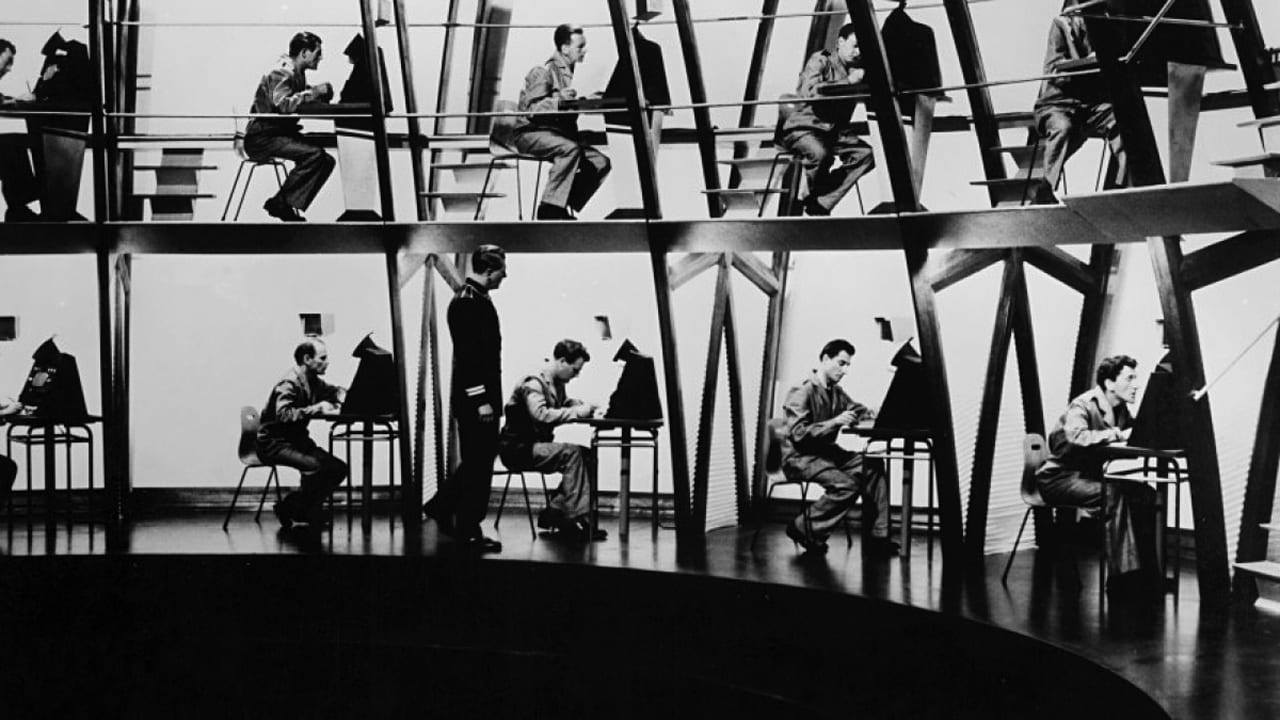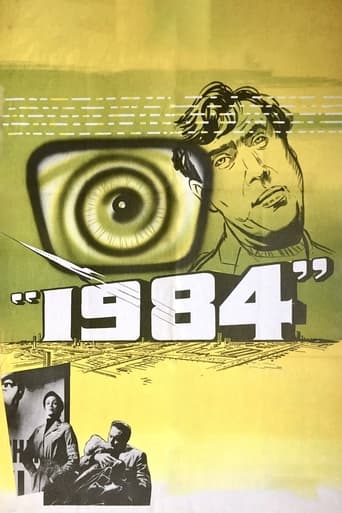

This is a relatively faithful rendering of one of the novels that I remember from my youth. All the high school kids (who read anything) were reading it and talking about it. This was in the early sixties. I could not put the book down as terrifying and depressing as it was. All elements of society were controlled by the leaders. It brings to mind modern North Korea where the citizens are clueless and fed jingoistic nonsense. Winston Smith is a worker who has an intellectual side. He begins, through connections with others, to see that there is something wrong with the way he and his fellows are treated. Everything is controlled. He is ill and every day is like the last. Big Brother is looking out for everyone. He's probably not a real person, but they don't know. Winston meets Julia and they start to have a relationship. We know where this is going. As bad as things are, the producers don't get into some of the even more oppressive business of the government. Not a story for the squeamish.
... View MoreIt's been too long since I read the book, so I'm just concerned with the movie as a movie. And what a downer the 90-minutes is for the generally sunny 1950's. Hard to think of a grimmer storyline or more downbeat ending for that period. I take the film's anomalous presence as a useful Cold War commentary on the Soviet Union, the rivalry then at its peak. Anyhow, the sets are grim, even the one outdoor scene is drained of any natural beauty, while the photography remains dull gray, as it should be given the dystopian subject matter. Then too, the two leads, O'Brien and Sterling, are not exactly marquee names. However, they are excellent actors, as the storyline requires—you don't want "movie stars" competing with the plot-heavy symbolism. In short, the production, though clearly economical, is pretty uncompromising. Story-wise we're plunged into the middle of the dystopian society without much explanation of how it got that way or why. Instead, the narrative emphasizes the tools of thought control among Party members, who are subjected to all sorts of thought conditioning techniques, such as the histrionic hate sessions. Just how the non-party people live is not really portrayed. However, love may be forbidden among Party members, but I doubt that it was among the common people, otherwise how would re-population take place.Besides dwelling on Winston's (O'Brien) efforts at contacting the political underground, the script dwells on the forbidden love affair between Winston and Julia (Sterling). And I had to laugh when Julia sheds her shapeless Party uniform for a flowing white gown right out of the Loretta Young Show of the time. This may be the movie's one concession to 1950's norms. The film does manage a few twists, one of which I didn't see coming. But, if I have one complaint, it's that Redgrave's high Party official lacks subtlety, in pretty much a one-note performance. This can be seen as a defect if you think about his official's changing roles. Anyway, the film remains a visual oddity for then as well as now. However, its thought- control message, though crudely put, may be more relevant in our digitalized age than it was then. At the same time, this is one of the few subjects that I think needs a bigger budget remake to do it justice. I haven't seen the latest remake from 1984, so I can't comment on its worth. All in all, this version maintains a grimly narrow, but thought-provoking focus.(In passing—having seen the movie on first release, I seem to remember the "rat cage" sequence as being longer, more detailed with glowing eyes, and much scarier than my DVD version. But then that was well over 50-years ago.)
... View MoreHopefully everyone knows the story of author George Orwell's novel and then the subsequent movie, Nineteen Eighty-Four. Even the cult classic movie Brazil in 1985 has an Orwell type features and themes through the entire fabric of the film. In fact the working title for for the highly futuristic Brazil was 1984 and a half.In the future, the people of Oceania are in a endless, living in a state of poverty, fear, and oppression. Even personal will and thought are monitored for the common good. Meals are rationed and virtually every move is monitored through video cameras and police agents. Winston has memories of when life was better and he expounds about it in a private journal that he keep hidden. Winston begins making eye contact with a younger woman named Julia; it's not long afterward that they are part of the rebellion against the state.George Orwell published his book in 1949. The novel found fame because of its portrayal of everyone watching everyone else and loss of personal rights in the face of a oppressive government. He chose the year 1984 as the target date for Big Brother as he called it.There was a BBC version of the movie followed by the 1956 Edward O'Brien film. Together the movies were able to cause only a minor stir and that was for sending people back to the book to read the full story. This version was directed by Michael Anderson who did such films as Around the World in 80 Days and Logan's Run in 1976. This movie is just not well done, it lacks timing and any degree of suspense. If you can find the BBC version try that one first. Even though there is some combining of characters, Donald Pleasance is in it and does a pretty good job.
... View MoreDingy, atmospheric version of George Orwells tale concerning two citizens of the New World Order involved in illicit, illegal love. Nothing is pretty in this story, and perhaps O'Brian and Sterling are a bit long in the tooth for the characters the author had in mind, however the superb dramatizations overcome any casting mishaps. The story of life in a totalitarian society rings chillingly familiar today. And, in the conclusion, to quote the poet laureate of our times, Todd Rundgren "Winston Smith Takes it on the Jaw Again!"
... View More